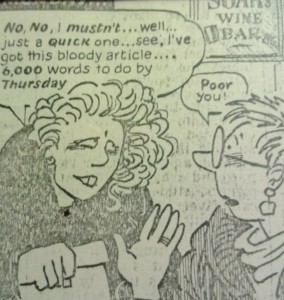It's a rare writer who never suffers from writer's block. If you do, you're in good company: it hampers even the most successful writers. When asked the most frightening thing he'd ever encountered, Ernest Hemingway declared “a blank sheet of paper”. ALLi blog editor Debbie Young shares her experience.
I know how Hemingway felt. Decades ago, I was a staff writer on a monthly business magazine. At any time of the month, the casual observer could tell how close we were to our deadline by the level of activity in the office.
The Power of the Deadline
In the week after an issue had gone to press, we'd go shopping a lot and take long lunches. When in the office, we'd lark about. We amassed a fine gallery of photocopies of our faces. (We were VERY young!) By week two, we'd be halfheartedly flicking through press releases in search of news, but by the end of week three, we'd be burning the midnight oil. Around this time, writer's block would kick in, and we'd loudly bemoan our fate as if awaiting execution. But by the end of week four, we'd always file our copy, sending it laboriously by telex and fax to our US publisher's office (no email in those days!)
A deadline is a wonderful cure for writer's block, but when as a self-published author, your deadline is self-imposed, it's nowhere near as imperative.
I may still be a last-minute merchant, but at least I've now learned that when writer's block strikes, there are constructive things you can do to deflect it. Here are my five top tips:
1) Stop Trying – and Do Something Different
Don't sit staring fretfully at your blank screen or page, feeling your anxiety mount. That's about as likely to help as lying awake in bed at 2am, worrying why you're not asleep. Get up, go elsewhere. Do something constructive that uses a different part of your brain and body. Read a book, bake a cake, do the ironing – anything that distracts you from your writing. (This may or may not include photocopying your face.) Activity involving physical exercise is especially good because it releases feel-good endorphins into your bloodstream to lift your mood.
2) Practice “Good Writing Hygiene”
Just as doctors recommend “good sleep hygiene” to cure insomnia (i.e. retiring in an environment conducive to sleep), I think there's such a thing as “good writing hygiene”. Organise your workspace in the way that makes you most likely to write uninterrupted. If a particular stationery makes the words flow, indulge in it. Roald Dahl, writing in his garden shed, always used yellow legal pads and Ticonderoga pencils, especially imported from the USA. J K Rowling favoured coffee shops. Those choices may not work for you, but find out what does, and stick with it.
3) Move Your Writing Time
Notice when your writer's block strikes. If it's always at the same time of day, reschedule your writing time to when you are naturally at your most creative. It might be late at night when the rest of the household is asleep, or first thing in the morning before the distractions of the day kick in. .
4) Tidy Your Workspace
If you've ground to a halt, take a break to tidy your desk. Although my threshold for untidiness is relatively high, I find working in a muddle debilitating. Even when I'm on a tight deadline, taking half an hour out to rationalise my workspace can save time in the long run. Fans of feng shui will readily agree, and even cynics will enjoy the virtuous glow that is the by-product of a good tidying session.
 5) Write Anything Rather Than Nothing
5) Write Anything Rather Than Nothing
In Dodie Smith's classic coming-of-age novel, I Capture The Castle, the teenage heroine locks her author father into his room after his writer's block has forced his whole family into penury. She instructs him: “Write anything – write ‘the cat sat on the mat' if you like. Anything, as long as you write.”” He takes her at her word, and once he starts writing again, the words and meaning flow. It's like cranking up an engine with a starting handle. (I've often wondered whether Dodie Smith was speaking from personal experience.) So write anything rather nothing – you can always edit it later, once you are creatively back on track.







[…] 5 Cures for the Self-Published Writer’s Block […]
[…] 5 Cures for the Self-Published Writer’s Block […]
[…] 5 Cures for the Self-published Writer’s Block – by Debbie Young […]
Ooh, I like that idea, Elizabeth – never heard of the Pomodoro method but it sounds helpful. Thank you.
I don’t believe in writers’ block, but I do recognise the problems associated with distractions (especially FB/Twitter) and fear of failure. If I’m working on something ‘easy’ like a book review or a blog posting, I can keep going for as long as it takes. However, for stories or novel chapters, I use the ‘Pomodoro method’ where I set a timer for 25 minutes, then give myself 5 minutes for FB, putting kettle on, loo break – or just strolling around the garden before moving on to the next block of time. After a few blocks, I usually find I am forgetting to start the timer and just ploughing on regardless.
I hadn’t heard of the Pomodoro method either but may try it. My problem is one of routine. Having been away a lot over the summer I have got out of the habit of writing on a daily basis except in a delightful notebook. This is fine on a plane or train or when waiting for either but impossible in the car. This year I also made the decision not to take my laptop on holiday which was a good thing. I have Julia Cameron’s The Artist’s Way and do use her method The Morning Pages. This is writing anything – rubbish included – for 3 pages which has worked for me in the past. Thanks Debbie by bringing up this subject.
[…] Top tips to cure the indie author’s “writer’s block” | Self-Publishing […]
Alison, I’m sure we can all relate to the issue of distraction, which was the root of the problem I had in my 20s on the magazine – we were all far too easily distracted by each other’s frivolity!
But one problem we didn’t have in those days was the 21st century temptation of social media tabs, luring us siren-like from the menu bar at the top of the page. Anyone lacking the discipline to turn those off should consider downloading one of the programmes available that block them for your designated writing time.
Fear of a less than perfect result is undoubtedly a big factor, solved by getting anything down on to the page and then constantly redrafting, even though any serious writer ought to be well aware that perfect copy is unlikely flow from their pen at first attempt. Getting the first draft down is the quick and easy bit – it’s the endless revisions that are the really hard work!
Lindsay and Alison, this is getting interesting – I think we’re on our way to redefining writer’s block here, if indeed we decide it does actually exist!
Debbie, Yes! Fear of being less than perfect, a huge, paralizing, problem in life and in writing…
Distraction rather than block is my problem. But if staring at the page, brain cells squidging around helplessly, I type any old thing that pushes the story forward. When I come back to it, I can then work it up into something that may qualify as first draft.
Not being bothered is just laziness. Writing is a job as well as a creative joy. Deal with it, as my heroine says. 😉
More seriously, I think we have to get rid of the fear of not writing something perfect. Perhaps that’s the root of block?
That’s a very good point, Lindsay. I hardly ever get writer’s block these days, but I’d been putting that down to the success of my avoidance tactics and to decades of experience of journalism and business writing which got me into the habit of just pounding stuff out to meet a specific deadline, before editing it for as long as I had left to knock it into shape. What do others think?
I think you’re lucky to’ve been a journalist – I’m sure it helps – but, by experience, I’d say agree with all you’ve said and have discovered the stuff by trial and error myself, over time… SO … I’ve come to not believe in ‘writer’s block’ only in the things which make it look like it exists (ie there’s always a way out even if it’s the ironing..)
I don’t believe in writer’s block. There’s always a reason why you can’t write. I’ve been ‘blocked’ 40.000 words into my novel, and I’m just starting to recognise why. The chapter I’ve got stuck on is a key one, but there are crucial aspects of my character I haven’t understood well enough, so, I can’t write the chapter. Without more work, it won’t work – that’s my mantra on writer’s block!
Lindsay – SO TRUE! I’ve had this one too – it takes recognising there’s More Work to be Done!!!